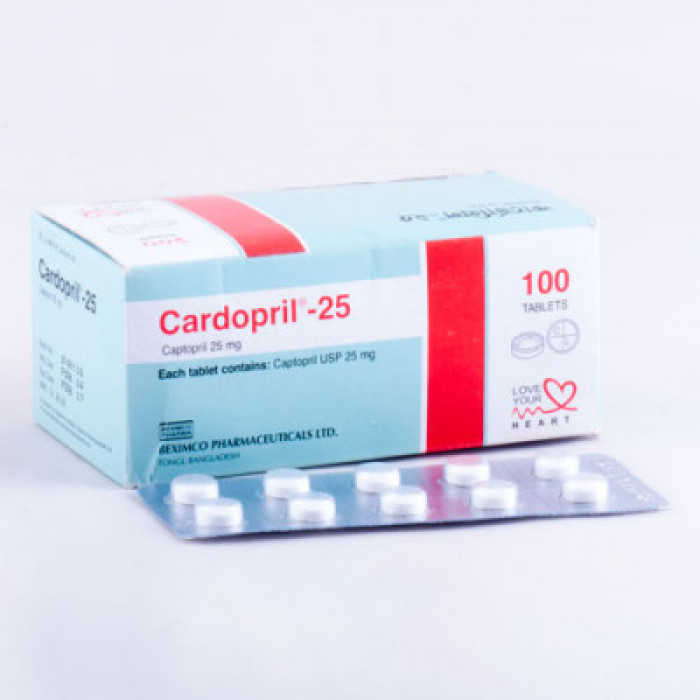
✔ 100% Authentic Product
👁️ Currently Viewing 1189
Cardopril -25
Manufacturer/Distributor: Beximco Pharmaceuticals Ltd.
Generic Name: Captopril 25 mg Tablet
Discount
Price: ৳ 29
MRP:
৳
30.1
5%
Off
✅ Description:
Captopril
Indications
Hypertension: Mild to moderate hypertension as an adjunct to thiazide therapy in patients who have not responded effectively to thiazide treatment alone.
Severe hypertension: Where standard therapy has failed. Cardopril is effective alone or in combination with other antihypertensive agents especially thiazide type of diuretics. The blood pressure lowering effect of Cardopril and thiazides are approximately additive.
Congestive heart failure: It is also used as an adjunct to the treatment of severe congestive heart failure.
Pharmacology
Captopril competitively inhibits the conversion of angiotensin I (ATI) to angiotensin II (ATII), thus resulting in reduced ATII levels and aldosterone secretion. It also increases plasma renin activity and bradykinin levels. Reduction of ATII leads to decreased Na and water retention. This promotes vasodilation and BP reduction.
Dosage & Administration
Diabetic nephropathy:
- Adult: Type 1 diabetics: 75-100 mg/day in divided doses.
Post-myocardial infarction:
- Adult: May be started 3-16 days after MI. Initially, 6.25 mg/day followed by 12.5 mg tid for 2 days, then 25 mg tid. Maintenance: 75-150 mg/day in 2 or 3 divided doses.
Hypertension:
- Adult: Initially, 12.5 mg bid, 1st dose preferably at bedtime to avoid precipitous fall in BP, gradually increased at 2-4-wk intervals according to response. Maintenance: 25-50 mg bid. Max: 50 mg tid. Patients on diuretics: 6.25 mg bid.
- Child: Neonates and infants: 0.15 mg/kg. Max: 6 mg/kg in 2 or 3 divided doses according to response. Childn and adolescents: 0.3 mg/kg. Max: 6 mg/kg in 2 or 3 divided doses according to response.
- Elderly: Initially, 6.25 mg bid.
Heart failure:
- Adult: Initially, 6.25-12.5 mg bid or tid. Maintenance: 25 mg bid or tid. Max: 50 mg tid.
- Child: Initially, 0.25 mg/kg/day, increased up to 2.5 or 3.5 mg/kg/day in 3 divided doses.
* চিকিৎসকের পরামর্শ মোতাবেক ঔষধ সেবন করুন'
Interaction
Concurrent treatment with NSAIDs reduces hypotensive action and increases the risk of nephrotoxicity. Additive hyperkalaemic effect with K supplements, K-sparing diuretics, and other drugs (e.g. heparin). May increase risk of leucopenia with procainamide, allopurinol, cytostatic or immunosuppressants. May increase risk of lithium toxicity. Increased risk of nitritoid reactions with gold (Na aurothiomalate).
Contraindications
Angioedema related to previous ACE inhibitor treatment, hereditary or idiopathic angioneurotic oedema. Concomitant use with aliskiren in diabetic patients. Pregnancy.
Side Effects
Neutropenia, anaemia and thrombocytopenia; proteinuria, elevated blood urea and creatinine, elevated serum potassium and acidosis; hypotension, tachycardia; rashes usually pruritic, may occur; Reversible and usually self limiting taste impairment has been reported. Stomatitis resembling aphthous ulcers has also been reported.
Pregnancy & Lactation
Pregnancy Category D. There is positive evidence of human foetal risk, but the benefits from use in pregnant women may be acceptable despite the risk
Precautions & Warnings
Patients with bilateral renal artery stenosis, collagen vascular disease, aortic or mitral valve stenosis, volume and/or Na depletion. Renal impairment. Lactation.
Overdose Effects
Symptoms: Severe hypotension, shock, stupor, bradycardia, electrolyte disturbances and renal failure.
Management: Perform gastric lavage, administer adsorbent and sodium sulfate with in 30 min of ingestion; NaCl 0.9% IV infusion. Treatment with angiotensin-II may also be considered. Administer atropine in case of extensive vagal reactions or bradycardia. Pacemaker is also an option. Elimination may be enhanced by haemodialysis.
Therapeutic Class
Angiotensin-converting enzyme (ACE) inhibitors
Storage Conditions
Store below 30° C
⚠️Disclaimer:
At ePharma, we’re committed to providing accurate and accessible health information. However, all content is intended for informational purposes only and should not replace medical advice from a qualified physician. Please consult your healthcare provider for personalized guidance. We aim to support, not substitute, the doctor-patient relationship.






